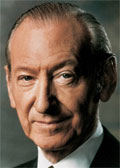 |
Kurt Josef Waldheimb. 21 Dec 1918, St. Andrä-Wördern, Lower Austria |
| Title: | Bundespräsident (Federal President) |
| Term: | 8 Jul 1986 - 8 Jul 1992 |
| Chronology: | 8 Jun 1986, elected by direct popular voting [1, pp. 12-13] |
| 8 Jul 1986, took the oath of office, session of the thirteenth Bundesversammlung (Federal Assembly), Großer Sitzungssaal des Parlaments, Parlamentsgebäude, Vienna [2] | |
| 8 Jul 1980, expiration of term |
| Biography: | ||||||||||||||||||||||
| Attended gymnasium at Klosterneuburg (1928-1936); served in the Austrian army as a volunteer (1936–1937); studied at the University of Vienna (1937-1938); conscripted into the German army (1938); served on the Russian front until he was wounded (1941); stationed in the Balkans (1942-1945); received his degree in law (1944); served as interpreter and intelligence officer for a German army unit engaged in brutal reprisals against the Yugoslavs and Jews - the fact he concealed until 1986; entered the diplomatic service (1945); served as first secretary of the Austrian Legation in Paris (1948-1951); head of the personnel department of the Ministry of Foreign Affairs (1951-1955); permanent observer for Austria to the UN and later that year became head of the Austrian Mission when Austria was admitted to the UN (1955-1956); Austrian minister plenipotentiary (1956–1958) and then ambassador to Canada (1958–1960); head of the political department (West) in the Austrian Ministry for Foreign Affairs, director-general for Political Affairs (until 1964); became permanent representative of Austria to the UN (1964–1968); appointed foreign minister (19 Jan 1968 - 21 Apr 1970) in the Cabinet of Josef Klaus; resumed the position of permanent representative of Austria to the UN (1970-1971); unsuccessfully contested the presidential election in Austria (1971), when he lost to the incumbent Franz Jonas; approved (22 Dec 1971) as Secretary-General of the UN (served 1 Jan 1972 - 31 Dec 1981); re-appointed (1976); his bid for a third term was blocked by a veto by China; was a target of public criticism when his involvement in war crimes was revealed in the Waldheim affair (1986); elected Bundespräsident (8 Jun 1986) and served from 8 Jul 1986 to 8 Jul 1992; throughout his term was deemed persona non grata by many countries. Biography source: [3] | ||||||||||||||||||||||
| Elections: | ||||||||||||||||||||||
|
||||||||||||||||||||||
| Source for election results: [1, pp. 12-13] | ||||||||||||||||||||||
| | ||||||||||||||||||||||
| [1] | "Bundespräsidentenwahl vom 25. April 2004" (Bundesministerium für Inneres, 2004) | |||||||||||||||||||||
| [2] | Arbeiter Zeitung, Nummer 156, Mittwoch, 9. Juli 1986. | |||||||||||||||||||||
| [3] | Österreich-Lexikon (web site). | |||||||||||||||||||||
Last update: 08 May 2025
